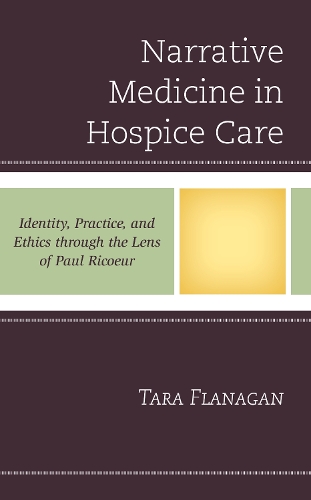
Narrative Medicine in Hospice Care: Identity, Practice, and Ethics through the Lens of Paul Ricoeur
(Hardback)
Publishing Details
Narrative Medicine in Hospice Care: Identity, Practice, and Ethics through the Lens of Paul Ricoeur
By (Author) Tara Flanagan
Bloomsbury Publishing PLC
Lexington Books
13th December 2019
United States
Classifications
Professional and Scholarly
Non Fiction
Popular medicine and health
Health systems and services
Medical ethics and professional conduct
Christianity
Theology
616.029
Physical Properties
Hardback
160
Width 159mm, Height 233mm, Spine 18mm
422g
Description
Narrative medicine, an interdisciplinary field that brings together the study of literature and medicine, offers both a way of understanding patient identity and a method for developing a clinicians responsiveness to patients. Scholars in narrative medicine maintain that the ability to be a close reader of texts, particularly literature, correlates with the ability to attend closely to ones patients, an ability referred to as narrative competence. While recognizing the genuine value of narrative competence in clinical encounters, and the value of narrative medicine in patient-centered care, Tara Flanagan examine the limits of self-narration for patients with cognitive and verbal deficits. In Narrative Medicine in Hospice Care: Identity, Practice, and Ethics though the Lens of Paul Ricoeur, Flanagan argues that the models of selfhood and care found in the work of Paul Ricoeur can offer a framework for clinicians, caregivers, and end-of-life patients regardless of their verbal and cognitive capabilities. In particular, Ricoeurs concept of the life-plan connects with the narrative method of life review in hospice and palliative care, and patient identity is a way to discuss religious and spiritual dimensions of patient experience.
Reviews
"Flanagan's book on hospice care is essential reading because it addresses care for patients as they are. It is very important to be present with patients and their families; to identify what they understand about their condition and how they feel about their lives; and to assist them in a useful, productive, and honest life review, a practice Flanagan skillfully describes. This book speaks to the many ways of caring for these patients and should be read by all those interested in providing the best care possible."
"Drawing both on narrative practices and on hospice philosophy, Tara Flanagan pays needed attention to the ethical dimensions of life review and to the role of religion in clinical care. Deeply grounded in the field of chaplaincy, in Narrative Medicine in Hospice Care, Flanagan reveals the theory behind her practice, with particular attention to the challenge of welcoming the stranger and bearing witness to the unheard. Flanagan's book is an indispensable guide to clinicians and academics alike and a testament to the power of human connection at the end of life."
Author Bio
Tara Flanagan is assistant professor of religious studies at Maria College in Albany, NY.
